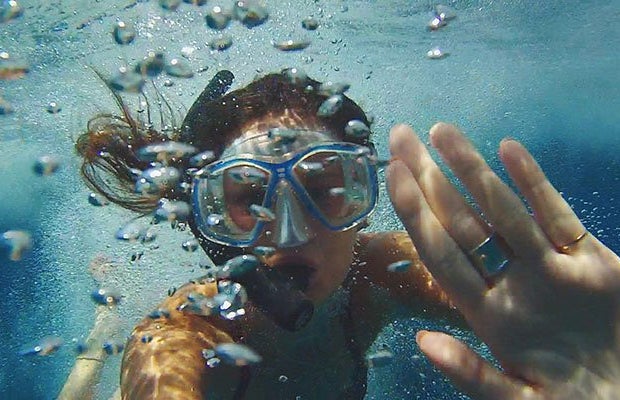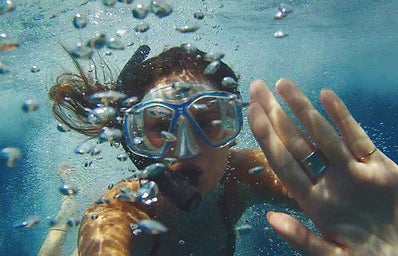Did you know that drowning is one of the major causes of death for ages 1-24? In the US, an average of 3,500 to 4,000 people drown per year, so, how can we work to prevent that?
According to the Encyclopedia Britannica, swimming is an activity that involves coordination of arm and leg motions to propel your body through water. However, swimming is not only a competitive sport, it also has health benefits. In the article “9 Health Benefits of Swimming” by Karen Asp, the well-being specialist Andrew Power says, “The unique properties of water have immediate physical benefits, like pain modulation.” As explained in the article, swimming may boost your brain power, improve your mood, help you sleep, help lower the intensity of conditions such as arthritis and fibromyalgia, and is overall a great activity for your bone health. Also, Brian J. Krabak, MD, clinical professor of rehabilitation, orthopedics, and sports medicine at the University of Washington School of Medicine in Seattle and National Team Physician for USA Swimming, says “swimming allows the heart to become stronger and the lungs to become more efficient in utilizing oxygen.”
Besides the health benefits, swimming is a life-saving skill. You don’t have to be an Olympic swimmer like Michael Phelps or Katie Ledecky, but knowing the basic skills of swimming, such as floating, breathing, and water-treading, is helpful. As indicated by the American Red Cross, there are 5 skills to save your life in the water:
- Step or jump into the water over your head.
- Return to the surface and float or tread water for one minute.
- Turn around in a full circle and find an exit.
- Swim 25 years to the exit without stopping.
- Exit from the water. If in a pool, be able to exit without using the ladder.
Learning these skills can help you in different ways. First most, they can help you feel comfortable in the water. Sometimes people feel comfortable only when they touch the floor/ground, but even touching the floor does not mean that you are comfortable or even enjoy water activities. The second one is that you can help yourself in case of an accident. For example, if you are canoeing and you suddenly flip over, if you know how to breathe correctly, you will not inhale water. Lastly, knowing how to move in the water can help you return to the wall if you accidentally fall into a pool. No one is drown-proof, and drowning doesn’t discriminate. Drowning can happen in as little as 20-60 seconds.
But why should knowing how to swim be a new trend? Living on an island surrounded by water, some of the main recreational attractions during the year involve bodies of water. Based on information obtained from Discover Puerto Rico, 270 miles of coastline of the island is fringed with nearly 300 beaches. Other attractions are the rivers and water parks. During the last years, there has been an increase in drowning cases in Puerto Rico. It was reported by the Forensics Science Institute, during 2019 to 2021, that there were 44, 53, and 46 drowning victims per year that include accidents in beaches, rivers, and pools. 12 drowning accidents have been reported in Puerto Rico during 2023. According to the Centers for Disease Control and Prevention (CDC), every year in the United States there are an estimated 4,000 fatal unintentional drownings—that is, an average of 11 drowning deaths per day.
As a competitive swimmer for 10 years, swimming instructor, and lifeguard, I decided to conduct a survey on the topic. 45 randomly selected people answered the online survey administered via Google Forms to answer various questions that included knowing if they knew how to swim, their skills/experiences, and facts about drowning. Out of 45 participants, only 8 participants answered that they did not know how to swim. Of those participants, 7 answered that they feel that not knowing how to swim is a disadvantage. Only 6 of them answered that they would take swimming lessons to learn basic skills. All the participants had to answer and explain the question, “Do you consider that knowing how to swim is important?” One of the participants answered, “knowing how to swim is much more important than learning how to ride a bike. We should be taught from a young age, because it is a survival skill and even more so when we live on an island.” Another participant answered, “it is something basic (like walking), we live on an island filled with water, there is no excuse for not knowing how to swim.”
Due to the increase in drowning cases, I decided to formulate the question, “Do you think that a law should be created to establish the obligation of knowing basic swimming skills?” Out of 45, only 8 answered “No” to that question. The participants had to explain their answer about the questions previously mentioned. A participant that was in favor answered, “I think it is an excellent idea, but, beyond creating a law, I would establish a project where people are educated about the importance of swimming. Not only as a sport or as a hobby, but as a necessary means for survival that can definitely minimize risks.” A participant that opposed answered, “I would not be in favor because not all citizens have the same facilities or resources to learn to swim. However, if the government provides aid and rehabilitates swimming centers around the island, it would consider establishing the aforementioned law.”
Beyond the survey, I decided to interview Pedro Altieri, the owner and founder of Total Aquatics Swimming School and an American Red Cross certified lifeguard instructor. I formulated questions based on the answers obtained from the survey, since some participants expressed their concerns about making swimming accessible for all the population.
Pedro Altieri expressed in the interview that he wanted to create greater awareness about drowning prevention. He wants to use his knowledge to make social media posts, offer conferences, and lead aquatic safety seminars. Besides his swimming school, he would like to form an alliance with the government to carry out more swimming programs around Puerto Rico. By organizing these kinds of programs, swimming instructors can benefit from federal aid and people may be eligible for swimming lesson scholarships to learn for free. As mentioned, he has a swimming school that offers classes for 12 months and up. Age is not a factor while learning how to swim because it is a survival skill that anyone can benefit from. You should not feel ashamed for not knowing how to swim. It is never too late to learn.
As a swimming instructor, my duty has always been to teach my students all the safety swimming skills they need to know in order to act in different situations. As a citizen, every day I get distraught when I hear about drowning victims in the news. It is important that we know how to swim and make it a new trend. That way, we can prevent drowning from happening and save lives in the process.


